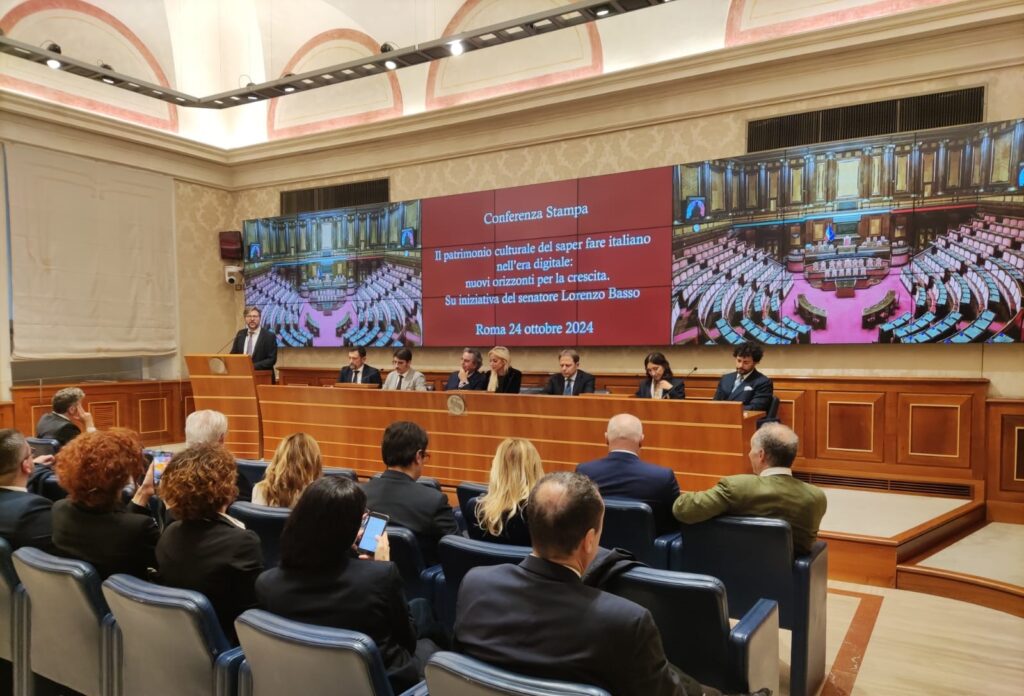
On 24 October, ETT was the protagonist of the workshop entitled ‘The cultural heritage of Italian know-how in the digital era: new horizons for growth’, which was held in the Sala Caduti di Nassirya of the Senate of the Republic in Rome. The event, promoted at the initiative of Senator Lorenzo Basso, offered an in-depth reflection on the role of digital technologies in enhancing Italy’s cultural heritage and Made in Italy excellence.
During the meeting, central themes such as the integration of digital technology in the process of cultural valorisation and success stories related to Corporate Museums were discussed. The relationship between innovation, cultural and territorial storytelling was explored, demonstrating how technology can serve to preserve and promote Italy’s rich historical heritage.
The meeting was moderated by Nicola Camurri, Sustainability Manager and lecturer in Marketing & Business Plan, and was attended by leading representatives of Italian cultural institutions and companies engaged in the protection and enhancement of cultural heritage.
The speakers included prominent names from the Italian cultural and business scene. In addition to Beppe Costa (President of Costa Edutainment and the Fondazione Palazzo Ducale di Genova) and Arianna Traviglia (Principal Investigator at the Italian Institute of Technology), Fortunato Amarelli (President of the Unione Imprese Centenarie Italiane UICITALIA and Managing Director of Amarelli Fabbrica di Liquirizia Srl), Elisa Zambito (Head of Education Ecosystem & Global Value Programs of Intesa Sanpaolo), Francesco Vena (Director of MUSEIMPRESA and Managing Director of Amaro Lucano Spa) and Francesco Rizzo (Studio Legale Improda – Avvocati Associati), Giovanni Verreschi (CEO of ETT Spa) spoke on a crucial issue for the future of Made in Italy: how to preserve and pass on the historical heritage of Italian know-how in the digital era.
Verreschi’s speech drew attention to a fundamental issue: it is not just a matter of protecting a quality brand, but of safeguarding a treasure trove of knowledge and traditions that is in danger of being lost due to the growing generation gap. Technology, in this scenario, emerges as a valuable ally. Through virtual reality (VR), it is possible to revive old workshops and allow young people to ‘learn the trade’ from the masters of the past. Augmented reality (AR), moreover, can transform a simple visit into an experience rich in information and practical demonstrations, while interactive environments offer new opportunities to learn traditional techniques.
A key role in this transformation is played by corporate museums, which can evolve from simple exhibition spaces to true centres of educational innovation. Verreschi emphasised how these venues can act as bridges between the past and the future, offering students the chance to immerse themselves in traditional knowledge through state-of-the-art technologies and thus creating a direct link between theoretical and practical training.
Looking to the future, Verreschi outlined some exciting possibilities: the use of artificial intelligence (AI) to preserve artisanal techniques, machine learning to document the most complex processes, and even blockchain to guarantee the authenticity of products. However, to fully realise this vision, a coordinated effort between different actors is essential. Verreschi proposed the construction of a national digital ecosystem that would network innovators, museums, schools and companies, so that Made in Italy can continue to represent global excellence and face the digital challenge as an opportunity to renew tradition without distorting it.
He therefore proposed the creation of a regulatory and operational framework to enhance Made in Italy business archives and museums through three lines of action: incentives to companies for the educational opening of archives, standardised protocols for collaboration between schools and businesses, and shared digital platforms. This public-private ecosystem aims to preserve the memory of Italian industrial innovation, inspire new talent and stimulate creativity, generating benefits for companies, schools and students.
